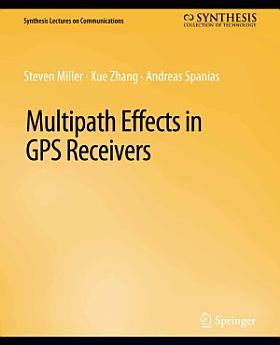Multipath Effects in GPS Receivers
2022년 5월 · Springer Nature
eBook
60
페이지
report검증되지 않은 평점과 리뷰입니다. 자세히 알아보기
eBook 정보
Autonomous vehicles use global navigation satellite systems (GNSS) to provide a position within a few centimeters of truth. Centimeter positioning requires accurate measurement of each satellite's direct path propagation time. Multipath corrupts the propagation time estimate by creating a time-varying bias. A GNSS receiver model is developed and the effects of multipath are investigated. MATLABtm code is provided to enable readers to run simple GNSS receiver simulations. More specifically, GNSS signal models are presented and multipath mitigation techniques are described for various multipath conditions. Appendices are included in the booklet to derive some of the basics on early minus late code synchronization methods. Details on the numerically controlled oscillator and its properties are also given in the appendix.
저자 정보
Steven Miller obtained his Bachelors degree from the University of Wisconsin and the Masters and PhD degrees from Arizona State University. He is the founder and CEO of Asperio DSP. He works on the design of algorithms and software tools for GPS, MSK, PSK, AM, and FM receivers. He serves as a VP Engineering and Director of Technology at Hemisphere GPS. He previously worked at Sicom, Honeywell and Fairchild as a member of the engineering staff. He co-developed advanced multi-frequency GNSS receiver including the analog frequency plan, digital based architecture, signal processing chop with hundreds of channels, and software based signal tracking algorithms. He has published in IEEE conferences and journals and he is the co-author of several patents. Xue Zhang joined the School of Electrical, Computer, and Energy Engineering at Arizona State University for her PhD degree in Fall 2010, and she is currently a PhD candidate under the supervision of Prof. Andreas Spanias and Prof. Cihan Tepedelenlioglu. Her research interests are in the areas of detection and estimation theory, localization in wireless sensor networks, and optimization. Her current research is localization in wireless sensor networks. She has served as a reviewer for IEEE journals and conferences. Andreas Spanias is Professor in the School of Electrical, Computer, and Energy Engineering at Arizona State University (ASU). He is also the director of the Sensor Signal and Information Processing (SenSIP) center and the founder of the SenSIP industry consortium (now and NSFI/UCRC site). His research interests are in the areas of adaptive signal processing, speech processing, and sensor systems. He and his student team developed the computer simulation software Java-DSP and its award winning iPhone/iPad and Android versions. He is the author of two textbooks: Audio Processing and Coding by Wiley and DSP; An Interactive Approach (2nd Ed.). He served as Associate Editor of the IEEE Transactions on Signal Processing and as General Co-chair of IEEE ICASSP-99. He also served as the IEEE Signal Processing Vice-President for Conferences. Andreas Spanias is co-recipient of the 2002 IEEE Donald G. Fink paper prize award and was elected Fellow of the IEEE in 2003. He served as a Distinguished lecturer for the IEEE Signal processing society in 2004. He is a series editor for the Morgan & Claypool lecture series on algorithms and software.
이 eBook 평가
의견을 알려주세요.
읽기 정보
스마트폰 및 태블릿
노트북 및 컴퓨터
컴퓨터의 웹브라우저를 사용하여 Google Play에서 구매한 오디오북을 들을 수 있습니다.
eReader 및 기타 기기
Kobo eReader 등의 eBook 리더기에서 읽으려면 파일을 다운로드하여 기기로 전송해야 합니다. 지원되는 eBook 리더기로 파일을 전송하려면 고객센터에서 자세한 안내를 따르세요.






